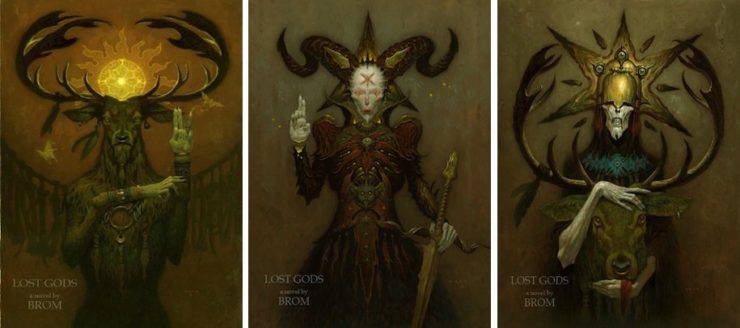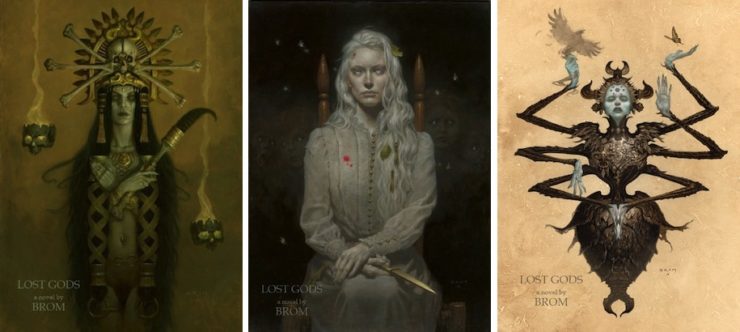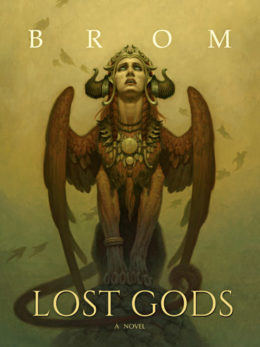Recently released from jail after a stint on drug charges, Chet Moran is determined to turn his life around, starting with reconciling with his pregnant girlfriend, Trish. Her father has forbidden their relationship, and when the couple make their hasty escape, Chet accidentally hits his high school nemesis, Coach, with his car. They find sanctuary on an island off the coast of South Carolina, his ancestral homeland now occupied by his grandmother, Lamia. Decades before, Lamia’s abusive husband, Gavin, murdered her two sons and tried to kill her. Afterward she lost custody of her daughter, Cynthia, Chet’s mother. Despite having not seen Lamia since he was a child, they have an arcane psychic connection to each other.
But hiding out with his doting grandmother proves too good to be true. The ghosts of hundreds of dead children haunt the island, led by two demon children with an ominous attachment to Lamia. Before he and Trish can flee, Chet is brutally murdered. A depressed angel named Senoy convinces Chet to descend into the underworld to recover a magic key that was stolen from him by Gavin. The key, Senoy insists, will allow him to summon angelic backup to kill Lamia once and for all, and if Chet works fast enough he just might spare the souls of Trish and their unborn child as well.
Chet undertakes an epic quest through the lands of Purgatory, befriending and pissing off lost souls, dead gods, and unruly spirits. Hell has marked him as one of the Damned, and with Lucifer and his demons hot on his trail, Chet manages to entangle himself in a fomenting proxy war between the ruling gods and encroaching demons. As Chet desperately hunts for Senoy’s key, Trish takes on Lamia in a battle of will. It takes all of Trish’s know-how and self-confidence to stay alive long enough to try to break free of Lamia’s bloody grasp.
As has been mentioned in other reviews of Brom’s works, one of the clunkiest aspects of his novels are the humans. In Lost Gods the humans, dead or alive, function more as chatty plot devices than as fully realized protagonists or antagonists. Trish is two-dimensional, a character as developed as a second-tier guest star role on a cop procedural. Gavin and Senoy, the two men suffering the longest from Lamia’s wrath, have just enough personality to inspire or impede Chet, depending on what the plot needs them to do at any given moment. Without any real depth to their characters, their aid or betrayal carries little emotional weight. Even Lamia is a one-note villain who appears in the narrative out of nowhere and reappears only to remind the reader of Chet’s motivation. We learn little of who or what she is or why she does what she does other than “reasons.”

Although he’s the main character, Chet is just as underdeveloped as the rest of them. His afterlife is perpetually at risk, but his quest feels more like Odysseus’ journey. Most of his time in Purgatory is spent not searching for the key but exploring the landscape and meeting new people. It’s as if the key/child killing plot is just there to give Chet a reason to go on an undead walkabout and learn about the political systems in the Underworld.
That being said, I have never read a Brom novel for the humans. Brom is a masterful worldbuilder, an artist with a keen eye for dense, vivid creativity. His version of Purgatory is unlike anything I’ve ever seen. As undercooked as Chet’s above-ground plot is, what goes on down below is intriguing and engaging. Purgatory is in the middle of a Game of Thrones-like upheaval. The ancient gods, killed off by the contemporary ones and banished to the underworld, rule Purgatory, a land bordered by sundry heavens and hells. Demons, lorded over by Lucifer and the fallen angels, live in Hell but enter Purgatory to collect or trade for wandering Damned souls.
The souls inhabiting Purgatory break down into various groups: those that serve the lost gods (willingly and unwillingly), those who have fallen into such deep despair that they seek oblivion in the Rivers Styx or Lethe or waste away into nothingness, those eking out a meager kind of life after death, and those who see Purgatory and its souls as a resource to be exploited or an empire to be controlled. This latter group takes on the ancient gods, wanting to kill them and take Purgatory for themselves. They team up with Hell, hoping to use their god-killing technology to turn the tide of the Purgatory rebellion.
At first, the audience thinks this might not be such a bad thing, given the abuse Chet and his allies suffer at the hands of the gods and their retinue. But it soon becomes clear that afterlife under the greencoats and Hell’s minions would be far worse for the human souls than anything the already weakened gods could inflict. Ostensibly, Lost Gods is a dark tale of one man’s journey to save his wife and daughter, but it’s more concerned with what it means to be free and the lengths people will go to have a life, even in death. Chet’s quest is interesting not because of Chet but in spite of him. The things he witnesses and participates in are fascinating in the thought and detail put into them by Brom. The text is accompanied by gorgeous and terrifying illustrations, and his descriptions of Purgatory and the gods is lush and lurid. The concept and worldbuilding are bold and refreshing, and Brom offers a unique twist on a well-worn topic.

Brom is a strong, compelling writer who pushes his narrative in unexpected directions. My indifference for the human characters was overwhelmed by the engrossing descriptions to the point where I could hardly put the book down. I loved Chet’s explorations of Purgatory and found myself wishing he could have done more of it. Kali is referenced several times, and based how Brom describes her it would’ve been so cool if Chet had encountered her. Same with Lucifer.
Fans of Brom will find a lot to love in Lost Gods, but will also be prepared for the lack of character development and meandering plot. New readers might have a harder time finding the groove, but the best tip I can give is to not look to hard at the structure and just let the story carry you along. Trust me, it will reward your immersion. A mashup of classical mythology, Dante, and Lovecraftian horror, Lost Gods drags you into Chet’s nightmare and never lets go.
Lost Gods is available from HarperCollins.
Alex Brown is a teen librarian, writer, geeknerdloserweirdo, and all-around pop culture obsessive who watches entirely too much TV. Keep up with her every move on Twitter and Instagram, or get lost in the rabbit warren of ships and fandoms on her Tumblr.










